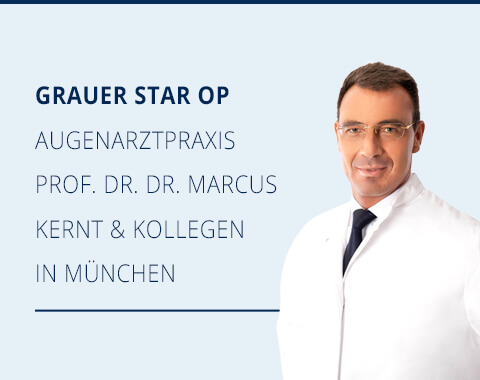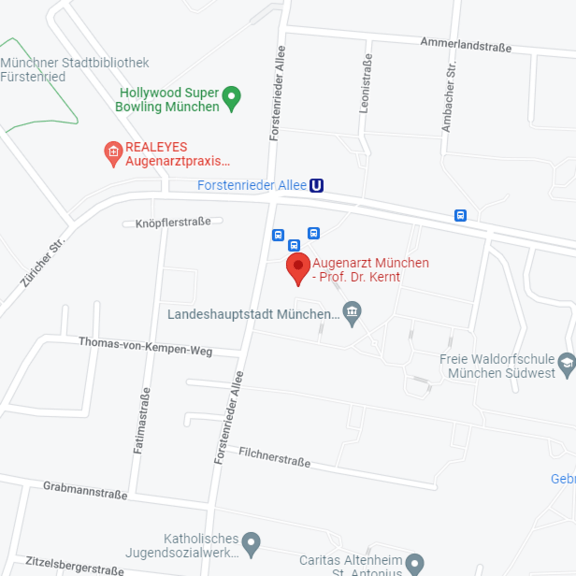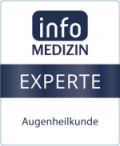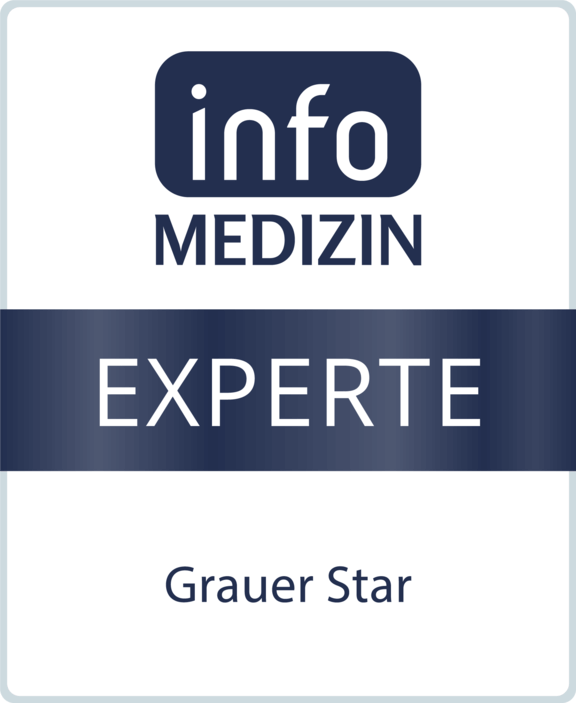Cataract
The cataract is one of the most common eye diseases; it is characterised by the slow, progressive clouding of the lenses. For sufferers, the world gradually disappears behind a veil of fog and increasingly defies perception. Prof. Marcus Kernt is your expert in the treatment of cataracts.
Cataract - operation
Until only a few decades ago, to regain their eyesight cataract patients had to undergo a painful and not entirely safe procedure. This has changed significantly in recent years, because thanks to the surgical procedure used by Prof. Marcus Kernt, where the diseased lens is carefully and gently replaced by an artificial lens, cataract treatments are now pain-free and low-risk. Cataract surgery is now a minimally invasive procedure and one of the most common surgical procedures overall.
The operation
Modern minimal invasive surgical procedures enable the safe and low-risk treatment of cataracts. During a short and pain-free procedure, the diseased lens is replaced by an artificial lens. The surgical treatment of cataracts is one of Prof. Marcus Kernt’s areas of expertise, and he has many years of experience in cataract surgery. The right time to perform the treatment depends on objective factors as well as on the subjective degree of impairment, which means limited vision for those affected. Today, the treatment is one of the most common surgical treatments – each year, more than half a million people undergo cataract surgery in Germany. It is an outpatient operation and only takes 15-20 minutes. The patient can go home shortly afterwards. During the procedure, the diseased lens is divided into small fragments via a tiny incision in the cornea using high-frequency ultrasound. As a rule, the lens capsule and associated structures are fully preserved in this procedure, which is called phacoemulsification. The particles are then gently sucked out and the artificial lens is put into place. Another state-of-the-art technique is the computer-aided treatment with the femtosecond laser. In this case, the laser’s light pulses perform the surgical steps, replacing scalpel and ultrasound. Sometimes, the natural lens capsule in which the artificial lens rests becomes cloudy after a while. This “aftercataract" can be corrected with straightforward and painless laser surgery.
The lens types
The artificial intraocular lenses must be selected carefully, because they determine the patient’s future visual acuity. There is a wide choice, from the standard monofocal lens to the high-tech lens with additional functions. The so-called premium intraocular lenses are able to correct specific visual defects and corneal curvatures (astigmatism), and they make wearing glasses largely redundant. Monofocal lenses have a protection filter for UV light and can correct short- as well as long-sightedness. They usually offer good visual comfort. The costs for the standard lenses are covered by the health insurance companies. Patients have to pay a share of the costs of special lenses. Unlike standard lenses, multifocal intraocular lenses are able to significantly improve age-related near vision loss and certain other visual defects. In certain situations, using different focal points, they can enable good vision at various distances. Others improve night vision and contrast vision (aspheric lenses) or they improve distance vision – such as when driving or watching TV (toric lenses). So-called pseudo-accommodative lenses are designed to give the patient continuous focused vision at all distances. However, they do not currently meet this requirement and can only be recommended to an extent. Yellow blue light filtering lenses, on the other hand, have an additional protective filter against short-wave light. Prof. Kernt discusses the best possible solution for your vision problem with you in advance.
The diagnosis
At an early stage of the eye disease, the clouding cannot be seen with the naked eye – only a medical examination can provide certainty. An accurate diagnosis is essential for planning and performing the procedure. In addition to a general eye examination using a slit lamp, Prof. Marcus Kernt also uses cutting-edge diagnostic procedures. 3D cataract analysis using so-called Scheimpflug imaging is a modern and highly reliable way to examine the anterior segment of the eye. This innovative method optimally maps the cornea, iris and the anterior eye chamber. A topographic analysis of the corneal surface enables the three-dimensional measurement of the cornea, and anterior segment optical coherence tomography (OCT) is used to examine the eye lens and tells you about how far the cataract has progressed. Optical biometry is used to exactly measure the artificial lens. In contrast to the standard ultrasound method, this measurement is contactless and does not require a local anaesthetic.
Do you have any more questions about cataract surgery? Then please call us on 089 217 687 02 – we are happy to advise you!
Your ophthalmology specialist - Prof. Marcus Kernt
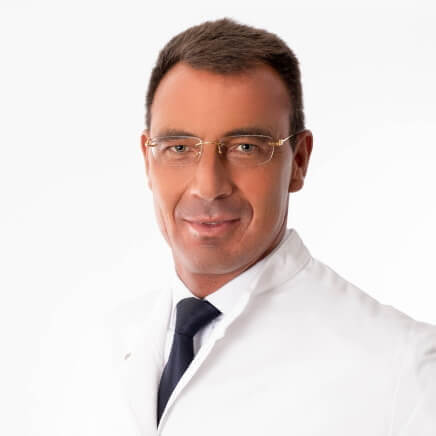
Throughout his career as a specialist in ophthalmology, Prof. Dr. med. habil. Marcus Kernt gained significant professional expertise and experience in the treatment of and research into eye diseases. He earned his medical degree at the renowned Ludwig Maximilian University (LMU) in Munich, to which he maintains close ties to this day. He qualified as a university lecturer (German “Habilitation” degree) in 2011 and became a regular member of the faculty. In 2015, he was appointed full professor for eye surgery and health management by the University of Oxford, UK. Since then, in addition to his practice in Munich, he has been active in research and teaching.
Training and career
He started his professional career at the university hospital of the LMU. Prof. Kernt’s interest in ophthalmology began during his undergraduate degree. He was a registrar at the eye clinic of the LMU, where he also gained his specialist qualification in ophthalmology. He gained valuable experience during his time at the university eye clinic in Munich. During his training he also gained extensive knowledge and insights into all areas of eye medicine. It was at that time that Prof. Kernt developed a special interest in diseases of the retina and refractive surgery – which are two of his specialist fields today. Following his accreditation as a specialist, Prof. Kernt spent many years as a senior physician at the eye clinic of Ludwig Maximilian University. He worked in the area of refractive surgery and cataract surgery at Munich University as the deputy head of the Centre for Refractive Therapy (CRT). Together with Prof. Ulbig and Prof. Haritoglou, he was head of the special consultations for age-related macular degeneration and diabetic eye diseases.
Further training and research abroad
In addition to his work at the eye clinic of Munich University, Prof. Kernt attended further training courses and undertook research in London, Paris and Bangalore, where he expanded his knowledge in various fields of ophthalmology. He underwent further study in vitreoretinal surgery and retinology at the renowned Moorfields Eye Hospital in London under Prof. Alan Bird and Zdenek J. Gregor and studied oculoplastic surgery and lid surgery under Prof. Richard Collin. Collin is one of the world’s leading specialists in this field. A short time later, his career took him to Paris. There he worked under Prof. A. Gaudric at Hôpital Lariboisiere, where he expanded his knowledge of retinology. Finally, in 2013, Prof. Kernt spent an extended period in Bangalore, at the Narayana Eye Hospital, where he expanded his knowledge in vitreous surgery.
Professional expertise and scientific work
Prof. Kernt has made a name for himself in ophthalmology research, both in German-speaking countries and internationally. In 2015 he received a professorship for Ophthalmic Surgery and Health Care Management at the famous elite university in Oxford in the UK, where he has been a regular member of the faculty ever since. He is the author of numerous medical articles, and he has published more than one hundred scientific papers listed on PubMed in various fields of ophthalmology. His expertise is also in demand at international conferences. His academic commitment has earned him numerous prizes and distinctions – in 2013, for example, he was awarded the highly acclaimed Theodor Axenfeld Prize for his outstanding scientific work. In 2016, his achievements in the field of ophthalmology were honoured at the International Congress of German Ophthalmic Surgeons (DOC). In 2014, he set up his own practice for ophthalmology in Munich-Fürstenried. In addition to his work as senior doctor in his practice, he regularly teaches at Munich and Oxford and continues to do scientific research. Prof. Kernt also gives advice to the readers of the medical portal “info Medizin” with informative articles and interviews.
Our ophthalmic practice – your port of call for good vision
Most people take good vision for granted. Only once our vision is impaired do we realise how much we depend on what is probably our most important sense – because 80% of our perception is through the eyes. Good vision is a prerequisite for an independent and self-determined life and therefore also crucial for quality of life. Our primary objective is therefore to preserve or at least significantly improve your eyesight. Prof. Kernt and his team want to give you back some freedom and independence so you can live your life the way you want to.
State-of-the-art diagnostics and innovative treatment concepts
Our ophthalmic practice provides eye care at the highest scientific level. We use the latest technical equipment and work according to the highest medical standards, to provide you with the best possible treatment. A wide range of diagnostic and therapeutic procedures allows us to draw up personal treatment plans that are tailored to the needs of each individual patient. The practice uses instruments normally only found in a clinic, providing diagnostic capabilities that ensure early detection and effective treatment.
Professional expertise and extensive experience
You are in the best of hands with Prof. Kernt and his colleagues. Their expertise, experience and personal service speak for themselves. Prof. Kernt has the highest level of expertise in all areas of ophthalmology. His specialist fields include the treatment of retinal and vitreous diseases using modern laser medicine. His specialist fields also include diabetic eye and retinal diseases as well as age-related macular degeneration.
Personal advice and support
Our patient-oriented practice team aims to make your stay in our modern consulting rooms as pleasant as possible. Our qualified and friendly staff always listen to your questions and make every effort to ensure that you receive professional care and advice.
We can be reached easily by public transport, with underground and bus stops on our door step (Forstenrieder Allee). There is plenty of parking nearby, and there is wheelchair-accessible access for your convenience.
Prof. Kernt and his team look forward to welcoming you in our ophthalmology practice in Munich-Fürstenried!
No medical progress without science and research
Science and research are the driving forces of medical progress. They are central to the development and research into new diagnostic methods and treatment options – which of course also applies to ophthalmology. New medical findings have to be proven empirically before they can benefit patients. To ensure that his patients can benefit from the latest and most modern and innovative ophthalmological methods, Prof. Kernt also works in science. Continuous further training and research are an integral part of his professional life. For many years, he focused on basic research in ophthalmology and clinical research. His contributions to science include research into cell biology, clinical research into new therapeutic methods for vascular retinal diseases and glaucoma, as well as the development of new intraocular lenses for better vision and optimum protection of the eye after cataract surgery. Last but not least, he also did research into new methods of imaging and diagnostics in ophthalmology. Prof. Kernt’s scientific work has attracted international attention, and he regularly passes on his extensive specialist knowledge in ophthalmology at conferences. His numerous and widely acclaimed scientific articles are published in prestigious scientific journals in Germany and abroad. We have compiled a selection of his papers on various topics of ophthalmology on this page. We are happy to provide you with information about Prof. Kernt’s current scientific work on request.
Contact
We are happy to advise you!
Prof. Dr. Marcus Kernt
Forstenrieder Allee 59
81476 München



